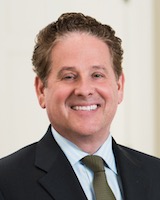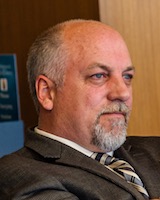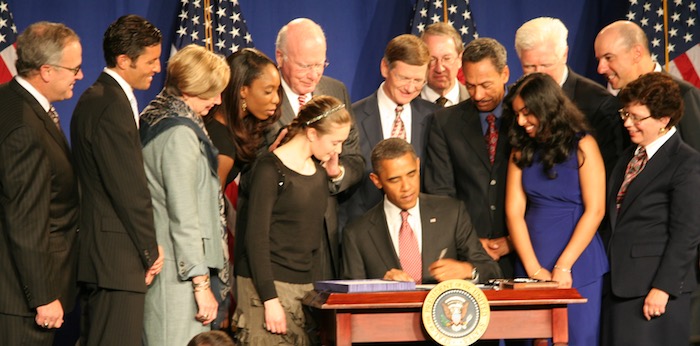At exactly 11:42am on September 16, 2011, President Barak Obama signed the America Invents Act into law. As President Obama put his pen down he said: “All right guys, congratulations, the bill is signed.” It was at this precise moment that U.S. patent laws dramatically changed forever. See The Bill is Signed: President Signs America Invents Act and Brave New World: First to File Becomes Law.
There had been much debate and discussion about the U.S. moving from a first to invent system to a first to file system. Under a first to invent regime, which was peculiar to the United States, it was possible for someone to be entitled to receive a patent if they could demonstrate they invented the core concepts first even if they filed a patent application after another party had already applied. Over the years it became increasingly difficult, if not practically impossible, for a second filer to demonstrate entitlement to a patent over a first filer. So the change was made to make America a first to file country. In so doing the grace period was substantially changed to the point where today it is hard to imagine a real world situation where it could be useful for an inventor.
As much focus and energy that was placed on the change from first to invent to first to file, without a doubt the biggest change to U.S. patent practice was the creation of the Patent Trial and Appeal Board (PTAB) and the simultaneous creation of three new opportunities for challengers to invalidate patent claims at the Patent Office. Inter Partes Review (IPR); Covered Business Method (CBM) Review and Post Grant Review (PGR) have been extraordinarily controversial. Indeed, it seems that many of the new Administrative Patent Judges (APJs) believe they were hired to invalidate patent claims rather than call balls and strikes in an impartial manner. It is impossible to ignore that the procedural and substantive deck has been substantially stacked against patent owners from the beginning.
Even today, overwhelmingly applications are still examined under first to file rules for two reasons: (1) First to file did not go into effect until March 16, 2013; and (2) If all claims in an application are entitled to priority from on or before March 15, 2013, the application will be examined under first to invent rules, which means it is still possible today to file applications that will be examined under first to invent rules. This is significant because the great majority of stakeholders have not felt the major substantive changes to the law ushered into being by first to file. Once this changes and applications are increasingly examined under first to file rules, the fact that foreign filed patent applications will be prior art in most cases as of their foreign filing dates will easily go down as the biggest change to the U.S. patent system once applications are examined under AIA first to file rules.
 These and other issues deserve far more attention as we look back five years after the fact. With this in mind, over the next two weeks we will be examining the AIA in great detail in a special AIA 5th Anniversary series. I’ve invited a number of guests to comment, discuss and/or editorialize about the AIA. Below is a sneak peak of some of the contributions already received. As articles are published this preview article will be updated with links to the entire series.
These and other issues deserve far more attention as we look back five years after the fact. With this in mind, over the next two weeks we will be examining the AIA in great detail in a special AIA 5th Anniversary series. I’ve invited a number of guests to comment, discuss and/or editorialize about the AIA. Below is a sneak peak of some of the contributions already received. As articles are published this preview article will be updated with links to the entire series.
Additional articles are expected. If you would like to contribute to this AIA 5th Anniversary series please feel free to contact us and see our Article Guidelines.
The Series
 I will begin the series with an article titled Misleading PTO statistics hide a hopelessly broken PTAB. In this article I take on the grossly misleading PTAB statistics disclosed by the USPTO. Because the PTAB does not have to issue a final written decision on all claims instituted it is possible for claims to be instituted having been initially declared likely to be invalid and then ignored by the PTAB later. The USPTO counts those claims as “remaining patentable,” which is disingenuous to say the least. I also address rumors I’ve heard about institution being more likely with multiple petitions because it makes it easier for PTAB judges to satisfy their production quotas.
I will begin the series with an article titled Misleading PTO statistics hide a hopelessly broken PTAB. In this article I take on the grossly misleading PTAB statistics disclosed by the USPTO. Because the PTAB does not have to issue a final written decision on all claims instituted it is possible for claims to be instituted having been initially declared likely to be invalid and then ignored by the PTAB later. The USPTO counts those claims as “remaining patentable,” which is disingenuous to say the least. I also address rumors I’ve heard about institution being more likely with multiple petitions because it makes it easier for PTAB judges to satisfy their production quotas.
 Manny Schecter, IBM’s Chief Patent Counsel, asks whether the post grant proceedings created by the AIA are serving their intended purpose. Focusing on inter partes review (IPR), Schecter ultimately concludes that the statistics show that IPR is not a true alternative to litigation and, instead, may actually promote litigation. Schecter also takes on the controversial issue of efficient infringement, which he says is caused by an IPR framework that favors alleged infringers. See Have We Met the Challenge of Creating Effective Post Grant Challenge Proceedings?
Manny Schecter, IBM’s Chief Patent Counsel, asks whether the post grant proceedings created by the AIA are serving their intended purpose. Focusing on inter partes review (IPR), Schecter ultimately concludes that the statistics show that IPR is not a true alternative to litigation and, instead, may actually promote litigation. Schecter also takes on the controversial issue of efficient infringement, which he says is caused by an IPR framework that favors alleged infringers. See Have We Met the Challenge of Creating Effective Post Grant Challenge Proceedings?
 Bob Stoll, former Commissioner for Patents and current partner with Drinker Biddle, believes that the problems many have with post grant procedures could be better fixed by the courts and the USPTO. Stoll believes that new legislation to fix perceived problems with PTAB administrative trials would be a mistake because changing the statute can be difficult without a negotiated agreement that makes everyone happy. Instead, Stoll recommends remedying problems through iterative changes by courts or the Administration. See New legislation is not needed to fix post grant procedures at the PTO.
Bob Stoll, former Commissioner for Patents and current partner with Drinker Biddle, believes that the problems many have with post grant procedures could be better fixed by the courts and the USPTO. Stoll believes that new legislation to fix perceived problems with PTAB administrative trials would be a mistake because changing the statute can be difficult without a negotiated agreement that makes everyone happy. Instead, Stoll recommends remedying problems through iterative changes by courts or the Administration. See New legislation is not needed to fix post grant procedures at the PTO.

 Oblon partners Stephen Kunin (former Deputy Commissioner for Patents) and W. Todd Baker (former member of the AIPLA Board of Directors) admit that the first few years of the new post grant regime were a learning experience for the PTAB and those practicing before the PTAB. In their essay, which is titled PTAB Administrative Trials Where Are We Now, they address the changes in practice, new PTAB rules, and the way the Federal Circuit treatment of post grant appeals is evolving.
Oblon partners Stephen Kunin (former Deputy Commissioner for Patents) and W. Todd Baker (former member of the AIPLA Board of Directors) admit that the first few years of the new post grant regime were a learning experience for the PTAB and those practicing before the PTAB. In their essay, which is titled PTAB Administrative Trials Where Are We Now, they address the changes in practice, new PTAB rules, and the way the Federal Circuit treatment of post grant appeals is evolving.
 Ashley Keller, Managing Director and co-founder of Gerchen Keller Capital, explores the AIA from a patent valuation standpoint. Keller will explain in his essay that patent investors are no different than any other investors, which means that they despise uncertainty. When uncertainty is in the air a risk premium is charged, and the AIA has created a cold cloud of uncertainty that hangs over the patent marketplace. Keller believes this will have long-term ramifications for research and development in the United States, and that it will drive technology underground in the form of trade secrets. See Valuing Intellectual Property in an AIA World.
Ashley Keller, Managing Director and co-founder of Gerchen Keller Capital, explores the AIA from a patent valuation standpoint. Keller will explain in his essay that patent investors are no different than any other investors, which means that they despise uncertainty. When uncertainty is in the air a risk premium is charged, and the AIA has created a cold cloud of uncertainty that hangs over the patent marketplace. Keller believes this will have long-term ramifications for research and development in the United States, and that it will drive technology underground in the form of trade secrets. See Valuing Intellectual Property in an AIA World.
 Alden Abbott, the Rumpel Senior Legal Fellow and Deputy Director of the Meese Center for Legal and Judicial Studies at The Heritage Foundation, will take the exact opposite approach from Stoll in his essay, titled Constitutional and Economic Policy Problems Raised by Inter Partes Review (IPR) Suggest Congress Should Consider Acting. After lamenting the fact that the Supreme Court has so far been unpersuaded to step into the IPR fray, Abbott thinks Congress should consider legislative changes to the Patent Act to reform post grant proceedings. Abbott concludes the legislative creation of the PTAB and the IPR process in the first place was the wrong response to the understandable desire to “do something” to improve patent quality.
Alden Abbott, the Rumpel Senior Legal Fellow and Deputy Director of the Meese Center for Legal and Judicial Studies at The Heritage Foundation, will take the exact opposite approach from Stoll in his essay, titled Constitutional and Economic Policy Problems Raised by Inter Partes Review (IPR) Suggest Congress Should Consider Acting. After lamenting the fact that the Supreme Court has so far been unpersuaded to step into the IPR fray, Abbott thinks Congress should consider legislative changes to the Patent Act to reform post grant proceedings. Abbott concludes the legislative creation of the PTAB and the IPR process in the first place was the wrong response to the understandable desire to “do something” to improve patent quality.
 Paul Morinville, an independent inventor who has tirelessly walked the halls of Congress visiting over 400 offices to lobby against patent reform, has contributed two articles to this series. In the first article, titled, How the America Invents Act Harmed Inventors, Morinville explains that the AIA turned the patent system on its head, and today inventors can scarcely do anything with their patents. Independent inventors can’t license their inventions, which means they can’t fund their companies to continue to research, develop and commercialize their inventions. In his second article, titled How the Patent Trial and Appeal Board Harms Inventors, Morinville explains that given how easy it is for corporations to challenge patents and tie up inventors with expensive legal battles, there are few disincentives to stealing patents. So if there is money in the patented invention it will be stolen.
Paul Morinville, an independent inventor who has tirelessly walked the halls of Congress visiting over 400 offices to lobby against patent reform, has contributed two articles to this series. In the first article, titled, How the America Invents Act Harmed Inventors, Morinville explains that the AIA turned the patent system on its head, and today inventors can scarcely do anything with their patents. Independent inventors can’t license their inventions, which means they can’t fund their companies to continue to research, develop and commercialize their inventions. In his second article, titled How the Patent Trial and Appeal Board Harms Inventors, Morinville explains that given how easy it is for corporations to challenge patents and tie up inventors with expensive legal battles, there are few disincentives to stealing patents. So if there is money in the patented invention it will be stolen.

 Kate Gaudry and Thomas Franklin, both attorney at Kilpatrick Townsend, take on the question of whether the AIA first to file rules have resulted in a greater number of provisional patent application filings, which you would expect given that the date of conception is no longer relevant. According to the analysis of Gaudry and Franklin, the data suggests that applicants have generally not changed their filing strategies to file more provisional applications in view of the AIA’s change to define prior art based on applications’ filing dates. See The AIA’s First-to-File Transition SHOULD have Resulted in More Provisional Filings.
Kate Gaudry and Thomas Franklin, both attorney at Kilpatrick Townsend, take on the question of whether the AIA first to file rules have resulted in a greater number of provisional patent application filings, which you would expect given that the date of conception is no longer relevant. According to the analysis of Gaudry and Franklin, the data suggests that applicants have generally not changed their filing strategies to file more provisional applications in view of the AIA’s change to define prior art based on applications’ filing dates. See The AIA’s First-to-File Transition SHOULD have Resulted in More Provisional Filings.
 Keith Fredlake, a partner with Kilpatrick Townsend, addresses the reality that under the AIA prior art no longer has a geographical limitation. In order to discuss the ramifications of this major change to U.S. patent law, Fredlake goes back to pre-AIA 102(e) and discusses the so-called Hilmer doctrine. He then painstakingly goes through the language of the AIA, pointing out that the term “effectively filed” now also refers to the earliest priority date of a foreign filed patent application if that application is used to establish priority in a U.S. patent application that publishes, U.S. patent that issues or in a PCT application that publishes. See Anticipating Expansion of Intervening Disclosures Under the AIA.
Keith Fredlake, a partner with Kilpatrick Townsend, addresses the reality that under the AIA prior art no longer has a geographical limitation. In order to discuss the ramifications of this major change to U.S. patent law, Fredlake goes back to pre-AIA 102(e) and discusses the so-called Hilmer doctrine. He then painstakingly goes through the language of the AIA, pointing out that the term “effectively filed” now also refers to the earliest priority date of a foreign filed patent application if that application is used to establish priority in a U.S. patent application that publishes, U.S. patent that issues or in a PCT application that publishes. See Anticipating Expansion of Intervening Disclosures Under the AIA.
 Phil Johnson, Senior Vice President-Intellectual Property Policy & Strategy at Johnson & Johnson, remains optimistic that the U.S. patent system is the best patent system in the world, but he writes that the promise of the AIA has yet to be fulfilled. In The AIA: A Promise Thus Far Only Partially Fulfilled, Johnson, who has been a vocal critic of the procedural fairness of the post grant proceedings created by the AIA, writes: “The current implementation of PTO post issuance proceedings is undermining confidence in our patent system, chilling innovation at its roots, and, in eyes of some, giving the AIA a bad name.” Johnson says the AIA has succeeded by allowing the USPTO to keep the fees it collects, but explains a variety of other AIA initiatives either haven’t worked or it concludes it is too early to tell whether they will be successful.
Phil Johnson, Senior Vice President-Intellectual Property Policy & Strategy at Johnson & Johnson, remains optimistic that the U.S. patent system is the best patent system in the world, but he writes that the promise of the AIA has yet to be fulfilled. In The AIA: A Promise Thus Far Only Partially Fulfilled, Johnson, who has been a vocal critic of the procedural fairness of the post grant proceedings created by the AIA, writes: “The current implementation of PTO post issuance proceedings is undermining confidence in our patent system, chilling innovation at its roots, and, in eyes of some, giving the AIA a bad name.” Johnson says the AIA has succeeded by allowing the USPTO to keep the fees it collects, but explains a variety of other AIA initiatives either haven’t worked or it concludes it is too early to tell whether they will be successful.

![[IPWatchdog Logo]](https://ipwatchdog.com/wp-content/themes/IPWatchdog%20-%202023/assets/images/temp/logo-small@2x.png)


![[Advertisement]](https://ipwatchdog.com/wp-content/uploads/2024/04/UnitedLex-May-2-2024-sidebar-700x500-1.jpg)
![[Advertisement]](https://ipwatchdog.com/wp-content/uploads/2024/04/Artificial-Intelligence-2024-REPLAY-sidebar-700x500-corrected.jpg)
![[Advertisement]](https://ipwatchdog.com/wp-content/uploads/2024/04/Patent-Litigation-Masters-2024-sidebar-700x500-1.jpg)

![[Advertisement]](https://ipwatchdog.com/wp-content/uploads/2021/12/WEBINAR-336-x-280-px.png)
![[Advertisement]](https://ipwatchdog.com/wp-content/uploads/2021/12/2021-Patent-Practice-on-Demand-recorded-Feb-2021-336-x-280.jpg)
![[Advertisement]](https://ipwatchdog.com/wp-content/uploads/2021/12/Ad-4-The-Invent-Patent-System™.png)






Join the Discussion
22 comments so far.
Curious
September 8, 2016 07:52 pmhe can be brought around
Why does he need to be “brought around” when you already wrote “[h]e actually tends to be right on most issues”? MM is wrong on most issues. Actually, he is probably wrong on all issues although I recall that he has made a (very) occasional valid comment from time-to-time — the hackneyed expression of a stopped clock between right 2 times a day coming to mind.
Anon
September 8, 2016 06:43 pmMr. Heller,
Your protest is simply not believable – and as stated, both what you say as well as when you “go silent” shows the lack of truthiness in your attempt at “no agenda.”
Edward Heller
September 8, 2016 06:18 pmNight, I have no “agenda” other than I am strongly in favor of a patent system that is cost effective for the startups, the small inventor and the university.
Edward Heller
September 8, 2016 06:15 pmCurious, all good points. MM does spend a lot of time blogging. He is either retired or employed doing so. If the former, he can be brought around, and I hope to do so as he is helping the fat cats at the expense of the weak even though he professes to do the opposite.
step back
September 8, 2016 01:30 pmThanks Night Writer @17
For those not internet savvy the full link to Robert Sachs’ article is:
http://www.bilskiblog.com/blog/2016/09/alicestorm-in-the-dog-days-of-summer.html
Sachs hits it on the nail’s head when noting that the concept of “law of nature” is over 750 years old, a Medieval and incorrect view of how science works.
The demigods of our Mount Olympus Judicial system are still entrenched in those Medieval mind molds. They have not a clue of how off base they are from modern thought. Their motto is Make America Greece Again.
Night Writer
September 8, 2016 11:38 am.bilskiblog.com/blog/2016/09/alicestorm-in-the-dog-days-of-summer.html
This is good by the way. The key to helping patents is exposing unethical judicial activists like Mark Lemley. Without the pseudo-intellectuals, Clinton or Trump will not have the will to finish the burning of the patent system.
Mark Lemley intentionally misrepresents facts in his papers (really vanity press trash) and intentionally misrepresents cites.
Night Writer
September 8, 2016 08:51 amI will also note that a recent article looked at the most anti-software patent judges and they are Taranto and Hughes which I have been saying for some time. It is very clear the two were selected by Google. Both ignorant of science. Both judicial activist with no respect for the Constitution or our laws. Shameful.
But, to imagine, that Edward is not like Taranto is ridiculous. He is pushing his advertising to try and get more business. “Have lots of 101 invalidity arguments. Will travel.”
Night Writer
September 8, 2016 08:48 amMM is obviously a paid blogger. So, to be brought around would mean to lose his job. Not likely.
Plus, Edward’s opinions on any matter should never be considered. He is obviously not blogging to understand patent law, but to advertise his services. I think the evidence for this is overwhelming when he “debates” people on this blog.
Night Writer
September 8, 2016 08:44 amThe fact is that Edward Heller is a good attorney, but he has an agenda and that includes misrepresenting science and the law.
I think it becomes obvious that Edward Heller is intellectually dishonest when he debates on this blog. He refuses to address substantive issues and tries to change the topic and then runs. These are the tactics of a troll and judicial activist that is misrepresenting science and the facts.
I will say to Gene that patentlyo has become a cesspool because of tactics like Edward’s and this blog is in danger of becoming a cesspool if Edward is not held accountable. Just reading some of the exchanges recently with Anon and Edward make it clear that Edward is employing troll tactics on this blog.
Edward is like a commercial. He speaks in one direction and then moves on. Pretty clear he is doing this as an advertisement for his services and to indicate that he is a member of the Lemley/Stern thinking so that they will accept him as one of them.
Curious
September 7, 2016 08:24 pmCurious, what I see from MM is a consistent bias against software patents.
MM has a consistent bias against ALL patents. He may be paid to blog against software patents, but his rants are not limited.
He also has been consistently against patenting information of any kind
Nobody patents “information” per se. Using information, however, is patentable. Using information (e.g., a description of the state of something) is commonly found in all types of invention: mechanical, electrical, and software.
I see software as enhancing the utility of machines, processes and computers
Software does much more than that. Software (of ALL kinds) underpin modern society.
I see a lot of people — here — wanting to patent discoveries of laws of nature, business methods and even products of nature, and would like to amend the patent laws accordingly.
You keep forgetting that SCOTUS said there is nothing inherently fatal with business methods. You keep forgetting that 35 USC 101 says nothing about business methods. Why aren’t you intellectually honest about those things? Of course, nobody can even agree on a definition for “business method” so how can a legitimate discussion be had on the issue when the terminology can mean one thing to one person and another thing to another person?
As to why MM is the way he is, well he does not like rich, entitled people, and says so.
And what does that have to do with patent law? Patents help both the rich and poor. However, the type of things that MM advocate for the patent system help the rich far more than the poor.
MM and I get along quite well even though we disagree.
You admitted yourself, you think MM is right on most issues. Consequently, there is not much of a beef between you two. I’ve read his stuff for a long time — he is nasty to most people by default.
I think MM can be brought around.
LOL — First, MM is virulently anti-patent. If you’ve read his posts from the very beginning (and picked up on the few hints he dropped from time to time) (this goes back almost 10 years), it appears that he is a PhD-educated biotech attorney who resented the success of partners who worked in the “softer” arts (e.g., software and business methods). This fueled his distaste for these types of patents. Eventually somewhere along the way, he was recruited as an anti-patent blogger. No (working) attorney I know of has the free time it takes to incessantly post like he does. Now that he is being paid to be anti-patent, there is ZERO chance that you’ll bring him around.
Anon
September 7, 2016 08:16 pmMr. Heller,
You could not be further into the weeds than thinking that Malcolm could be “brought around” or that he “listen[s] to reasoned arguments.”
You suffer far too much of the “align with Mr. Heller, so it must be worthwhile” syndrome. He listens to no one, and has been peddling the same “feelings” and ad hominem for ten solid years.
Turn around?
I say thee nay.
Edward Heller
September 7, 2016 07:04 pmanon, I don’t like all those personal attacks even though he directs them at others. Now, you and I get along quite well even though we disagree. MM and I get along quite well even though we disagree. I truly wish the use of personal attacks would stop. There are ways to confront the arguments/position of another without being rude and insulting. I think we all need to keep this in mind.
I think MM can be brought around. He is an avowed Democrat, and avowed democrats have always supported tort lawyers and for a good reason.
Edward Heller
September 7, 2016 06:53 pmCurious, what I see from MM is a consistent bias against software patents. There are reason why, and he states them often. I am not sure, but I might be the only person who actually jousts with him on this issue as I see software as enhancing the utility of machines, processes and computers.
He also has been consistently against patenting information of any kind, but mostly, laws of nature. MM thought Myriad would win for the reasons stated by Lourie.
I see a lot of people — here — wanting to patent discoveries of laws of nature, business methods and even products of nature, and would like to amend the patent laws accordingly. I know where MM would come out on this effort. I personally think that congress cannot patent or authorize the patenting of laws or products of nature. Business methods? Perhaps, but that might be a bad idea and needs to be honestly discussed. Perhaps Bilski and Alice were bad examples because they were claiming methods old and notorious, and thus fundamental, without much more.
As to why MM is the way he is, well he does not like rich, entitled people, and says so. What he does no seem to recognize is that the tort lawyers and their ilk perform an essential function: they keep big business honest and allow the little guy to sue for injury. Without the tort lawyer, this country would be 100% about the rich and entitled. Thus, MM is, to me, attacking the exactly wrong people. Perhaps we (all) can work on that with him just a bit. He does listen to reasoned arguments.
Anon
September 7, 2016 06:36 pm“He actually tends to be right on most issues and that is reason enough.”
Not only is not “right,” his woeful “logic” comprises merely “feelings” and ad hominem.
Mr. Heller, you lose credibility when you say such things.
And, as I pointed out above, you also lose credibility by when you go silent (and what you – continuously – choose to be silent about).
There is more than one path to your diminished credibility.
Your single worthwhile view cannot make up for what you otherwise say – and what you do not say.
Curious
September 7, 2016 01:27 pmThis is for NWPA. On a hunch, I googled Electronic Frontier Foundation (i.e., the anti-patent, and ‘all software should be free’ group) with Lemley. As it turns out, Mark Lemley is on their Advisory Board. Who would have thunk it?
Curious
September 7, 2016 01:22 pmHe actually tends to be right on most issues and that is reason enough.
Yoda: “That is why you fail.”
MM is anti-patent on almost ALL issues. Consequently, your belief that he is “right on most issues” means that you are anti-patent on nearly ALL issues.
most people due not like Trump for his crude mockery of others, people do not like MM
People used to think MM’s snark was cute. Then he became rabid — big-time. However, most people cannot stand MM because he is virulently anti-patent. Actually, there are other things, but his anti-patent stances are what drives his lack of popularity. He’ll name you a thousand “junk” patents for a single patent that he thinks is worthy. Honestly, I don’t recall him ever commenting that a particular patent was a “good” patent.
The only people who every buy into anything he says are examiners (who were trained under Dudas to consider any issued patent as a failure of the system), yourself, and MaxDrei (the long-time promoter of the European patent system who will jump at any chance to tear down the US patent system).
People who are interested in intellectual property are typically pro-intellectual property. They believe in it. This is why they go to blogs that discuss intellectual property. However, MM does not. Many of the Examiners who post on the other blog are not. You are not (except for your client). Your compadres are the anomaly. If you want to find kindred soles, go post on the Electronic Frontier Foundation website. However, when you come around claiming your support for patent rights, you are (rightfully) scoffed at because you have almost no credibility on that front.
Edward Heller
September 7, 2016 11:45 amCurious, I listen to MM despite his obvious bias. He actually tends to be right on most issues and that is reason enough.
And, just like most people due not like Trump for his crude mockery of others, people do not like MM. I don’t think he will ever learn that.
Curious
September 7, 2016 08:37 amwe will need support
I’ve told you this before, but your anti-patent stances on other issues do not help your cause. You are more than happy to feed-support-encourage the worse patent troll (MM) that happens to inhabit the other patent blog.
Your actions there have left a very bad taste in the mouth of many that could have supported you.
Anon
September 7, 2016 05:06 amMr. Heller states: “I am doing my part — I brought MCM Portfolio LLC v. Hewlett Packard. We are still in the field and fighting”
But you still do not ask the right questions, nor do you partake fully in any sense of inte11ectual honesty in the blog discussions, now do you, Mr. Heller?
You still have your own agenda. And certainly at most times** that agenda aligns with those that are anti-patent.
**patents as personal property appears to be the single largest exception to your alignment with the well-known anti-patent voices.
angry dude
September 7, 2016 12:24 am“It was at this precise moment that U.S. patent laws dramatically changed forever”
Me thinks not..
The US Patent system was already screwed after SCOTUS Ebay decision in 2006 – just a few months before I got my first (and last) US patent
“Fool me once – shame on you, fool me twice – shame on me”
Edward Heller
September 6, 2016 08:48 pmCurious, indeed the AIA did a lot of damage, a lot. There was no need for universal prior art except to benefit non US filers. There was no need to abrogate first to invent except to benefit non US inventors. There was no need to unfairly tip the scales against validity with IPRs and other PGRs with their lower standards of proof and unfair procedures, except to benefit infringers.
When one sees the list of beneficiaries, there is no doubt who was behind the AIA, and it was not US inventors, not US businesses, not US universities, not, not, not and not. We know who they were by who benefited. And, since we know who the were and are, let us not trust them again.
But what can we do? Give up?
I am doing my part — I brought MCM Portfolio LLC v. Hewlett Packard. We are still in the field and fighting. And if the Supreme Court takes cert, we will need support.
Curious
September 6, 2016 09:27 amFive years of the AIA (America Infringers Act). Infringers and big corporations everywhere are having a celebration. On the other hand, many small-time companies and inventors are wondering why they ever decided to employ the patent system (aka ‘the sport of kings’) to protect their inventions — a lot of money spent on patents that have little hope of being successfully enforced.